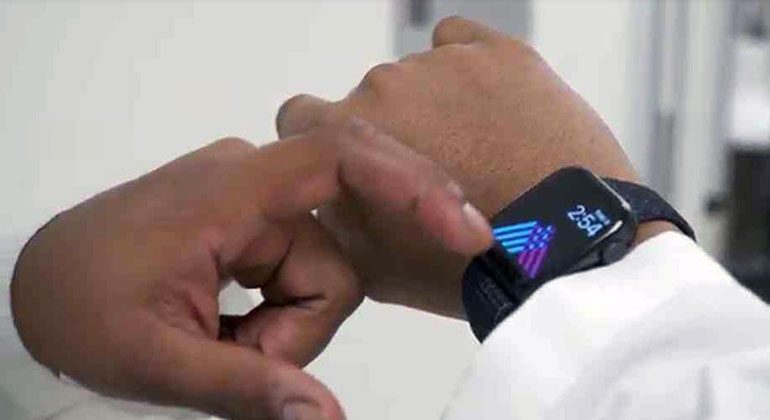Mount Sinai Researchers Use Wearable Devices to Identify Psychological Effects of Pandemic
Study links changes in heart rate variability with degree of resilience, as part of larger effort to understand and mitigate the effects of COVID-19 on health care workers

Health care workers with high resilience or strong emotional support were protected against the effects of stress related to the COVID-19 pandemic compared to those who had low emotional support or resilience, according to a study published September 13 in the Journal of Medical Internet Research. Mount Sinai researchers also found that the number of individuals with COVID-19 in the community was a significant factor associated with stress in health care workers over time.
The Mount Sinai team found that high emotional support or high resilience—the ability to overcome difficulty and a reduced vulnerability to environmental stressors—resulted in a unique nervous system profile, demonstrating that these features impact both how health care workers perceive stress and how their bodies are physically affected by stress.
“Our study highlights the importance of emotional support and resilience in moderating the effects of stress on health care workers during the ongoing pandemic,” said the study’s corresponding author Robert P. Hirten, MD, Assistant Professor of Medicine (Gastroenterology) at the Icahn School of Medicine at Mount Sinai, and member of the Hasso Plattner Institute for Digital Health at Mount Sinai and the Mount Sinai Clinical Intelligence Center (MSCIC). “Assessing the resilience and emotional support of health care workers may be able to help identify those at risk from ongoing stressors and may help guide health care institutions in allocating mental health resources for these at-risk employees.”
Several hundred study participants wore an Apple Watch that measured their heart rate variability and downloaded a customized app to complete weekly surveys measuring perceived stress, resilience, emotional support, quality of life, and optimism. Researchers found that health care workers with high resilience or high emotional support had different autonomic nervous system stress patterns compared with those who had medium or low emotional support or resilience. The autonomic nervous system is a primary component of the stress response and can be found by measuring heart rate variability. The participants’ physiological results aligned with their self-reported answers, the study concluded.
“The experience of this pandemic has been especially stressful for health care workers, and as a community we need to be able to support them, especially as the virus persists,” said the study’s co-author Zahi Fayad, PhD, Director of the BioMedical Engineering and Imaging Institute, Co-Founder of the MSCIC, and the Lucy G. Moses Professor of Medical Imaging and Bioengineering at Icahn Mount Sinai. “Our study is one of the first to document not only the toll the pandemic has taken on our health care workers, but also the importance of resilience and social support as specific paths toward efficiently and effectively directing support.”
The latest findings from the Warrior Watch Study build on previous research that used wearable devices to identify COVID-19 cases earlier than traditional diagnostic methods. Researchers monitored the participant’s physical activity and tracked subtle changes in their heart rate variability measured by an Apple Watch, which signaled the onset of COVID-19 up to seven days before the individual was diagnosed with the infection via nasal swab.
About the Mount Sinai Health System
Mount Sinai Health System is one of the largest academic medical systems in the New York metro area, employing 48,000 people across its hospitals and more than 400 outpatient practices, as well as more than 600 research and clinical labs, a school of nursing, and a leading school of medicine and graduate education. Mount Sinai advances health for all people, everywhere, by taking on the most complex health care challenges of our time—discovering and applying new scientific learning and knowledge; developing safer, more effective treatments; educating the next generation of medical leaders and innovators; and supporting local communities by delivering high-quality care to all who need it.
Through the integration of its hospitals, labs, and schools, Mount Sinai offers comprehensive health care solutions from birth through geriatrics, leveraging innovative approaches such as artificial intelligence and informatics while keeping patients’ medical and emotional needs at the center of all treatment. The Health System includes approximately 9,000 primary and specialty care physicians and 11 free-standing joint-venture centers throughout the five boroughs of New York City, Westchester, Long Island, and Florida. Hospitals within the System are consistently ranked by Newsweek’s® “The World’s Best Smart Hospitals, Best in State Hospitals, World Best Hospitals and Best Specialty Hospitals” and by U.S. News & World Report's® “Best Hospitals” and “Best Children’s Hospitals.” The Mount Sinai Hospital is on the U.S. News & World Report® “Best Hospitals” Honor Roll for 2024-2025.
For more information, visit https://www.mountsinai.org or find Mount Sinai on Facebook, Twitter and YouTube.